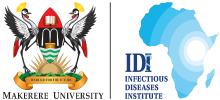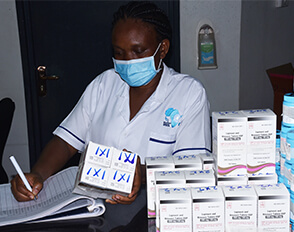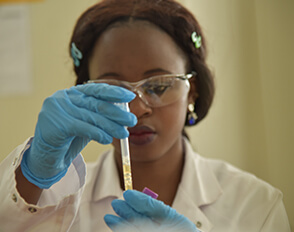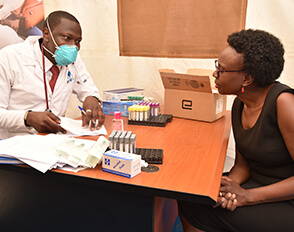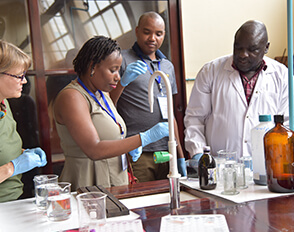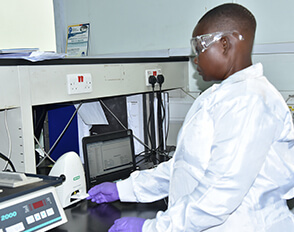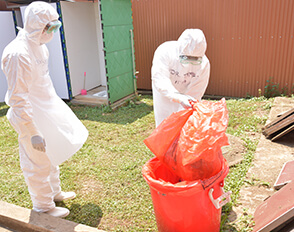
Global Health Security Partner Engagement Project
With funding from the United States Centres for Disease Control and Prevention (CDC), IDI is implementing the Global Health Security Partner Engagement Project. The project supports the Uganda Ministry of Health (MOH), other government agencies and partners in developing capacity in the following areas
Prevention of the Emergence and Spread of the Antimicrobial Resistance (AMR)
IDI supports the Government of Uganda to develop an integrated package of activities to combat AMR that spans human, animal, agricultural, food and environmental sectors.
- Policy: Through government structures including the National Task Force for Antimicrobial Resistance Surveillance for Human Health and the One Health Technical Working Group, IDI is contributing to the development of effective national policies and plans that are aligned and integrated with international systems.
- Surveillance: IDI is supporting the MOH Sexually Transmitted Infections Program to conduct surveillance for AMR among men with gonorrhoea. Blood cultures are being performed in hospitalized patients to identify common bacterial pathogens and describe patterns of resistance.
- Technical support and logistics: At facility level, IDI is supporting Medicines Therapeutics Committees with training, technical advice and supplies to support implementation of antibiotic stewardship programs. Similarly, Infection Prevention and Control (IPC) committees are supported to enhance hand hygiene and waste management practices and to support surveillance for healthcare-associated infections.
Strengthening the National Laboratory System
Uganda requires a nationwide laboratory system that safely and accurately detects pathogens causing outbreaks, including known and novel threats. IDI supports capacity to detect priority pathogens for AMR at the National Microbiology Reference Laboratory (NMRL) at the Uganda National Health Laboratory Services. Also, IDI supports the development of a network of microbiology laboratories that link to the NMRL.
- NMRL: Support provided by IDI to NMRL includes additional staffing, training, supplies and technical support to facilitate accreditation.
- Microbiology network: Nationwide, over 100 laboratory personnel have been trained and mentored in AMR, laboratory quality management systems and surveillance systems. Eight laboratories including the NMRL have benefited from installation of electronic database for processing AMR data.
Biosafety and Biosecurity
IDI supports a whole-of-government national biosafety and biosecurity system approach to ensure that especially dangerous pathogens are identified, held, secured and monitored in a minimal number of facilities according to best practices, underpinned by appropriate policy, legislation, laboratory licensing and a trained workforce.
- Policy and legislation: IDI is working with stakeholders including the Uganda National Council of Science and Technology on the development and review draft national policies and legislation and promoting advocacy and awareness of biosecurity issues in Uganda. In 2016, the first regional Biosafety and Biosecurity Conference was hosted in Uganda with support from the project. Professional bodies have been engaged to incorporate biosecurity to existing guidelines.
- Education: IDI supported the harmonization of a national curriculum on Bio-risk management for the human and animal health sector and the training of trainers to ensure national coverage of training capacity.
- Networks: IDI has supported the registration and start up activities of the Biosafety Biosecurity Association of Uganda.
- Technical support and logistics: At designated surveillance sites, IDI is supporting bio-risk management mentorship, pathogen inventory support and the provision of laboratory supplies.
Disease Surveillance, Outbreak Preparedness and Response
Acute febrile illness surveillance: In 8 regional hospitals, surveillance is ongoing to detect pathogens that cause fever in admitted children. The surveillance focusses on bacterial pathogens, vector-borne and zoonotic diseases. Project partners include the Infectious Diseases Research Collaboration, Department of Medical Microbiology, Makerere University and the Uganda Virus Research Institute. So far, over 4000 microbiology samples have been collected with results returned for clinical care and data reported to national authorities.
West Nile One Health Model: The West Nile sub-region of Uganda is bordered by the Democratic Republic of the Congo and South Sudan. Districts in this region host a large population of refugees. IDI is piloting a One Health model to strengthen outbreak preparedness and response by supporting district One Health teams to detect and report notifiable diseases and conduct outbreak investigations. Furthermore, the National Sample Referral and Transportation system is being strengthened to accommodate outbreak samples more efficiently and to evaluate the feasibility of integrating veterinary samples to this system.
Viral Hemorrhagic Fever Outbreaks: Coordinated by the National Task Force and Public Health Emergency Operations Centre, IDI contributed to the national response in the 2017 Crimean-Congo Haemorrhagic Fever outbreak (Kiboga and Nakaseke districts) and the Marburg virus outbreak (Kapchora and Kween districts). Working with Ministry of Health officials and partners, IDI contributed to Case Management and IPC.
